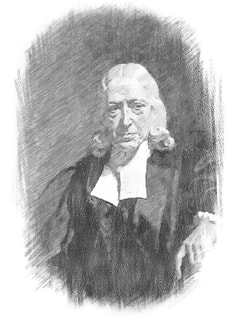
John Wesley, (born June 17, 1703, Epworth, Lincolnshire, England—died March 2, 1791, London), Anglican clergyman, evangelist, and founder, with his brother Charles, of the Methodist movement in the Church of England. After six years of education at the Charterhouse, London, he entered Christ Church, Oxford University, in 1720. Graduating in 1724, he resolved to become ordained a priest; in 1725 he was made a deacon by the bishop of Oxford and the following year was elected a fellow of Lincoln College. After assisting his father at Epworth and Wroot, he was ordained a priest on September 22, 1728

John Wesley, the travelling preacher who led a movement that became the Methodist Church, came to Athlone to open its society here 275 years ago.
To mark that anniversary, a number of special events will be taking place at the Methodist Church on Athlone's Northgate Street...................Trevor Parkes looks after the running of the Methodist church and outlined the history of the movement in Athlone since 1748.
He explained that John Wesley preached in Athlone on ten occasions in all, with people coming out barefoot to follow him into the town. Hundreds of townsfolk from all religious persuasions would come to hear him preach, in what is now Custume Place, and also to the rear of Athlone Castle at Main Street.
--Westmeath Independent; Athlone Methodist Church to mark 275-year milestone; 7.13.23
To mark that anniversary, a number of special events will be taking place at the Methodist Church on Athlone's Northgate Street...................Trevor Parkes looks after the running of the Methodist church and outlined the history of the movement in Athlone since 1748.
He explained that John Wesley preached in Athlone on ten occasions in all, with people coming out barefoot to follow him into the town. Hundreds of townsfolk from all religious persuasions would come to hear him preach, in what is now Custume Place, and also to the rear of Athlone Castle at Main Street.
--Westmeath Independent; Athlone Methodist Church to mark 275-year milestone; 7.13.23
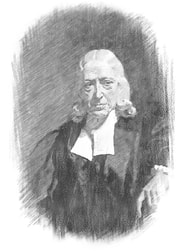
The elder — An appellation suited to a familiar letter, but upon a weighty subject.
To the elect — That is, Christian. Kuria is undoubtedly a proper name, both here and in 2 John 1:5; for it was not then usual to apply the title of lady to any but the Roman empress; neither would such a manner of speaking have been suitable to the simplicity and dignity of the apostle.
Whom — Both her and her children.
I love in the truth — With unfeigned and holy love.
--John Wesley's Explanatory Notes
To the elect — That is, Christian. Kuria is undoubtedly a proper name, both here and in 2 John 1:5; for it was not then usual to apply the title of lady to any but the Roman empress; neither would such a manner of speaking have been suitable to the simplicity and dignity of the apostle.
Whom — Both her and her children.
I love in the truth — With unfeigned and holy love.
--John Wesley's Explanatory Notes
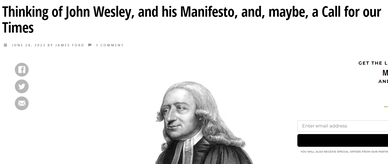
John attended Oxford, after which he was invited to teach. However he felt a call into ministry, and was ordered a deacon in 1725, and priested in 1728.
He was an amazing preacher. But also controversial. Eventually, Wesley’s spiritual journey led to the foundation of the Methodist movement.
Today, I find myself particularly thinking of the famous Manifesto he is often cited as writing. While he did not write it, it is considered an accurate summation of his principles.
The first iteration of the list was compiled by the scholar Gary Best for a Methodist chapel founded by Wesley, the New Room in Bristol, England. The original document was titled “John Wesley’s principles in the 18th century.” And followed with the question “a political manifesto for today?”
It certainly can be enriched. I think of his call to end slavery, given our times, should include a call to end the cascade of ugly consequences that can follow generations after the fact of slavery ends. And his call to improve the state of women can be expanded to a call for full and unambiguous rights. And with that to the rights of sexual minorities. I would also say that last principle addressing our relationship to the planet, can and needs to be more fully expanded.
But, all that totally acknowledged, oh my. What an interesting and compelling figure this man of the Eighteenth century was.
What a person, this John Wesley.
--James Ford; Monkey Mind; Thinking of John Wesley, and his Manifesto, and, maybe, a Call for our Times 6.28.23
He was an amazing preacher. But also controversial. Eventually, Wesley’s spiritual journey led to the foundation of the Methodist movement.
Today, I find myself particularly thinking of the famous Manifesto he is often cited as writing. While he did not write it, it is considered an accurate summation of his principles.
The first iteration of the list was compiled by the scholar Gary Best for a Methodist chapel founded by Wesley, the New Room in Bristol, England. The original document was titled “John Wesley’s principles in the 18th century.” And followed with the question “a political manifesto for today?”
- Reduce the gap between rich and poor
- Seek to ensure full employment
- Introduce measures to help the poorest, including a living wage
- Offer the best possible education
- Empower individuals to feel they can make a difference
- Promote tolerance
- Promote equal treatment for women
- Create a society based on values and not on profits and consumerism
- End all forms of enslavement
- Avoiding engaging in wars
- Avoid narrow self-interest and promote a world view
- Care for the animals with whom we share our planet.
It certainly can be enriched. I think of his call to end slavery, given our times, should include a call to end the cascade of ugly consequences that can follow generations after the fact of slavery ends. And his call to improve the state of women can be expanded to a call for full and unambiguous rights. And with that to the rights of sexual minorities. I would also say that last principle addressing our relationship to the planet, can and needs to be more fully expanded.
But, all that totally acknowledged, oh my. What an interesting and compelling figure this man of the Eighteenth century was.
What a person, this John Wesley.
--James Ford; Monkey Mind; Thinking of John Wesley, and his Manifesto, and, maybe, a Call for our Times 6.28.23
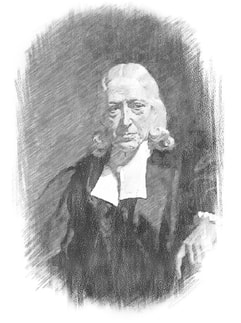 John Wesley Files
John Wesley Files
"That which the devil aimed at, was to persuade Eve to eat forbidden fruit; and to do this, he took the same method that he doth still. 1. He questions whether it were a sin or no, Genesis 3:1,2. He denies that there was any danger in it, Genesis 3:4. 3. He suggests much advantage by it, Genesis 3:5. And these are his common topics. As to the advantage, he suits the temptation to the pure state they were now in, proposing to them not any carnal pleasure, but intellectual delights."
--John Wesley (1703-1791)
"That which the devil aimed at, was to persuade Eve to eat forbidden fruit; and to do this, he took the same method that he doth still. 1. He questions whether it were a sin or no, Genesis 3:1,2. He denies that there was any danger in it, Genesis 3:4. 3. He suggests much advantage by it, Genesis 3:5. And these are his common topics. As to the advantage, he suits the temptation to the pure state they were now in, proposing to them not any carnal pleasure, but intellectual delights."
--John Wesley (1703-1791)
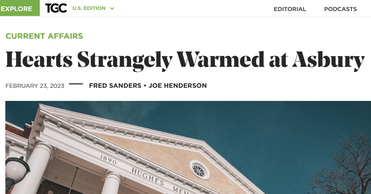
Asbury University stands in the Wesleyan tradition, which began as a revival of spiritual life within an established church. The 18th-century movement Americans call the First Great Awakening is known in the U.K. as the Evangelical Revivals. It started as a renewal in the Church of England, driven largely by the preaching of John and Charles Wesley. The transformative preaching of the Wesley brothers and their colleagues started when they went to what looked like ordinary chapel services and found their hearts “strangely warmed,” as John put it. “An assurance was given me that [God] had taken away my sins, even mine, and saved me from the law of sin and death.”
John Wesley had an experience of the love of God in Christ, which launched him on a historically powerful ministry, a life of service and proclamation. The students in Wilmore, nearly three centuries later, testify to a similar breakthrough experience of God’s love. As the Methodist movement spread, John Wesley commissioned Francis Asbury to take the work to the American colonies, which he did. As you drive into Wilmore, you pass a statue of Francis Asbury on horseback: the intercontinental link back to the great 18th-century revival is visible.
--Fred Sanders & Joe Henderson; Gospel Coalition: Hearts Strangely Warmed at Asbury 2.23.23
John Wesley had an experience of the love of God in Christ, which launched him on a historically powerful ministry, a life of service and proclamation. The students in Wilmore, nearly three centuries later, testify to a similar breakthrough experience of God’s love. As the Methodist movement spread, John Wesley commissioned Francis Asbury to take the work to the American colonies, which he did. As you drive into Wilmore, you pass a statue of Francis Asbury on horseback: the intercontinental link back to the great 18th-century revival is visible.
--Fred Sanders & Joe Henderson; Gospel Coalition: Hearts Strangely Warmed at Asbury 2.23.23
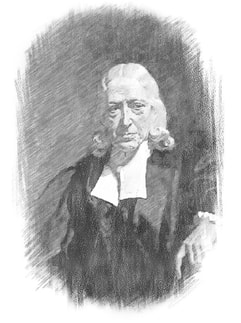 John Wesley Files
John Wesley Files
This is the history of the fourth day's work, the creating the sun, moon and stars. Of this we have an account,
--John Wesley
- In general, verse 14, 15. where we have,
- The command given concerning them. Let there be lights in the firmament of heaven - God had said, Genesis 1:3 Let there be light, and there was light; but that was, as it were, a chaos of light, scattered and confused; now it was collected and made into several luminaries, and so rendered both more glorious and more serviceable.
- The use they were intended to be of to this earth.
- They must be for the distinction of times, of day and night, summer and winter.
- They must be for the direction of actions: they are for signs of the change of weather, that the husbandman may order his affairs with discretion.
- In particular, Genesis 1:16,17,18, The lights of heaven are the sun, moon and stars, and these all are the work of God's hands.
- The sun is the greatest light of all, and the most glorious and useful of all the lamps of heaven; a noble instance of the Creator's wisdom, power and goodness, and an invaluable blessing to the creatures of this lower world.
- The moon is a lesser light, and yet is here reckoned one of the greater lights, because, though in regard of its magnitude, it is inferior to many of the stars, yet in respect of its usefulness to the earth, it is more excellent than they.
- He made the stars also - Which are here spoken of only in general; for the scriptures were written not to gratify our curiosity, but to lead us to God.
--John Wesley
 John Wesley Files
John Wesley Files
“As one instance of this, be always ready to own any fault you have been in. If you have at any time thought, spoken, or acted wrong, be not backward to acknowledge it. Never dream that this will hurt the cause of God; no, it will further it. Be therefore open and frank when you are taxed with anything; do not seek either to evade or disguise it; but let it appear just as it is, and you will thereby not hinder but adorn the Gospel.”
― John Wesley, John Wesley: A Plain Account of Christian Perfection
“As one instance of this, be always ready to own any fault you have been in. If you have at any time thought, spoken, or acted wrong, be not backward to acknowledge it. Never dream that this will hurt the cause of God; no, it will further it. Be therefore open and frank when you are taxed with anything; do not seek either to evade or disguise it; but let it appear just as it is, and you will thereby not hinder but adorn the Gospel.”
― John Wesley, John Wesley: A Plain Account of Christian Perfection
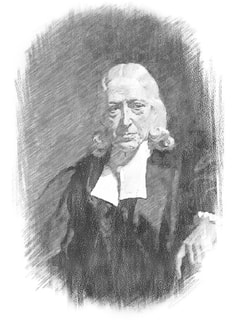 John Wesley Files
John Wesley Files
“Let us learn, lastly, to follow that direction of the great apostle, “Do not be haughty, but fear” (Rom. 11:20). Let us fear sin more than death or hell. Let us have a jealous (though not painful) fear lest we should lean to our own deceitful hearts. “Let him who thinks he stands take heed lest he fall” (1 Cor. 10:12). Even he who now stands fast in the grace of God, in the faith that overcomes the world, may nevertheless fall into inward sin, and by that suffer shipwreck of their faith (see 1 Tim. 1:19). And how easily then will outward sin regain its dominion over him! Therefore, O man, O woman of God! Watch always, that you may always hear the voice of God! Watch, that you may pray without ceasing, at all times and in all places pouring out your heart before Him! So shall you always believe, and always love, and never commit”
― John Wesley, The Essential Works of John Wesley
― John Wesley, The Essential Works of John Wesley

